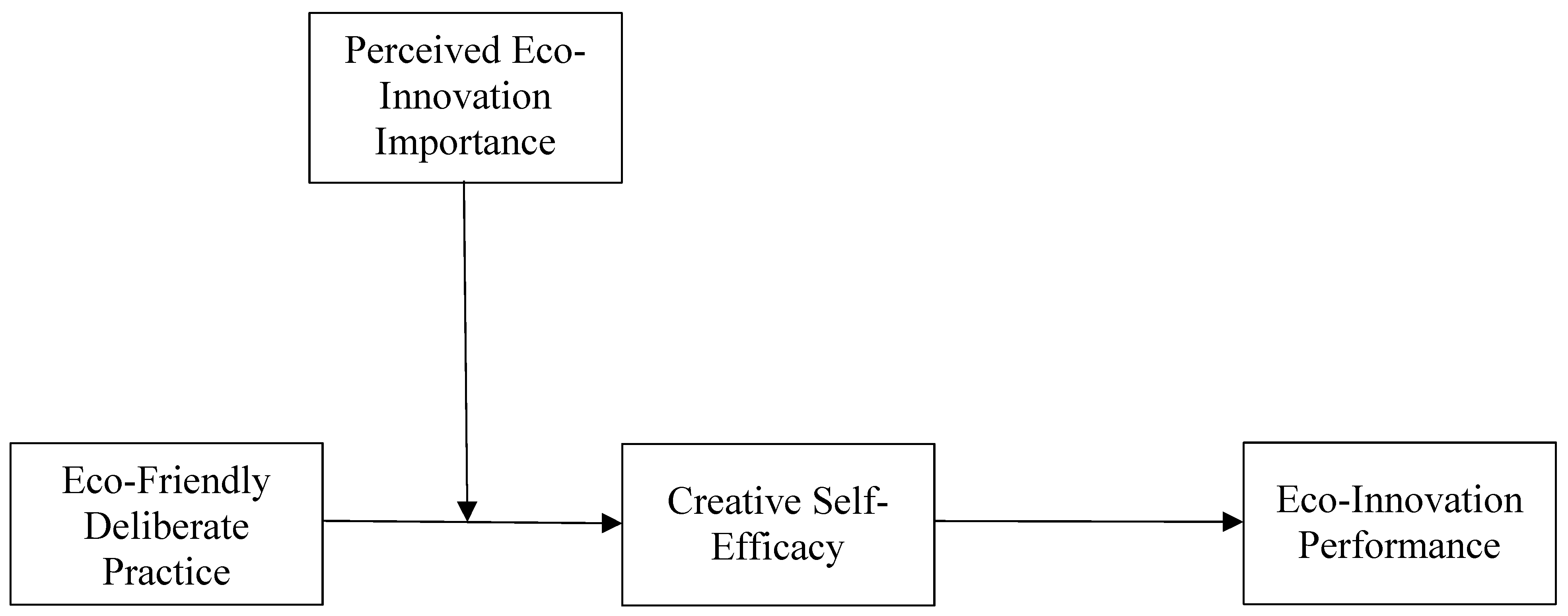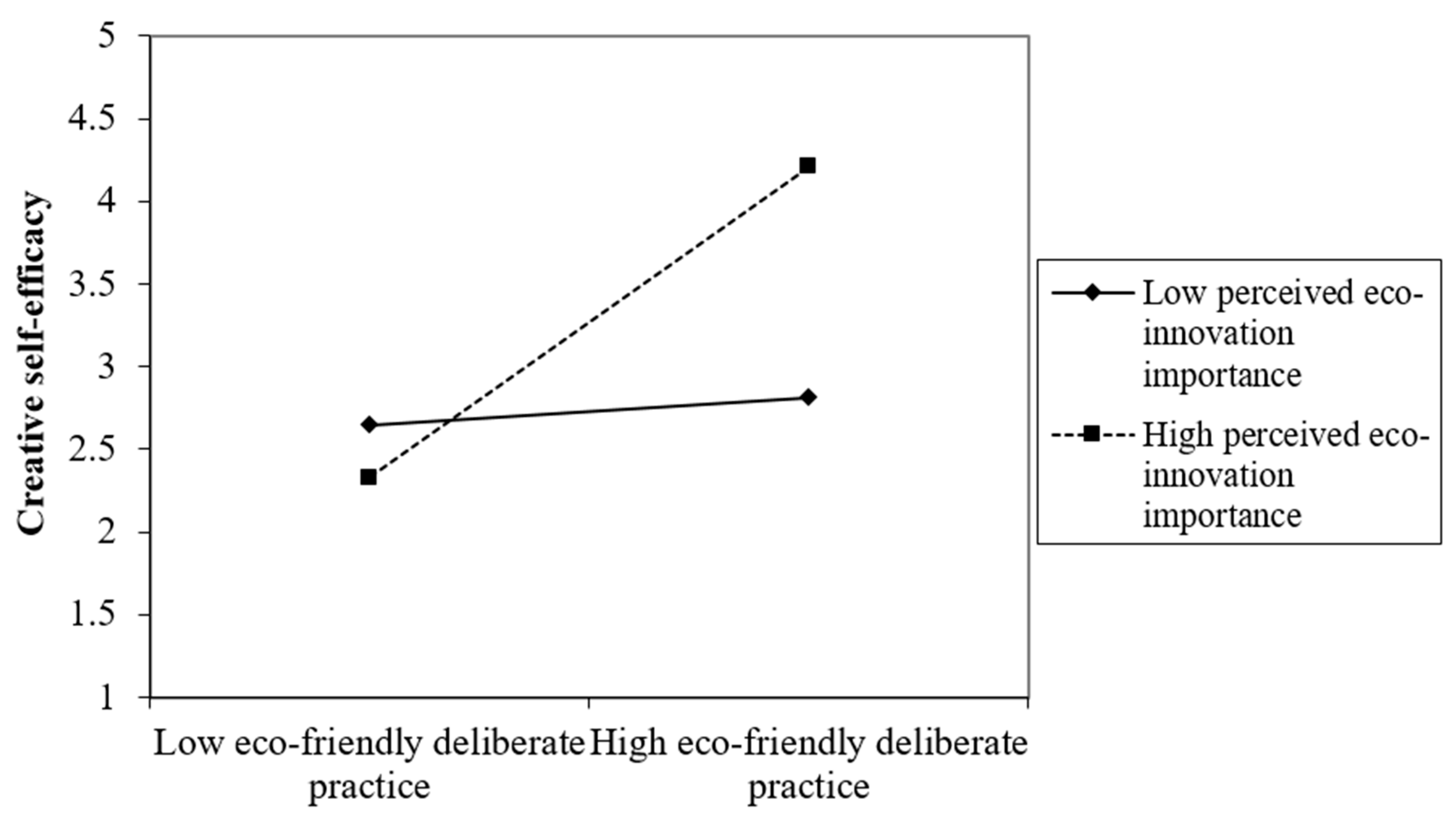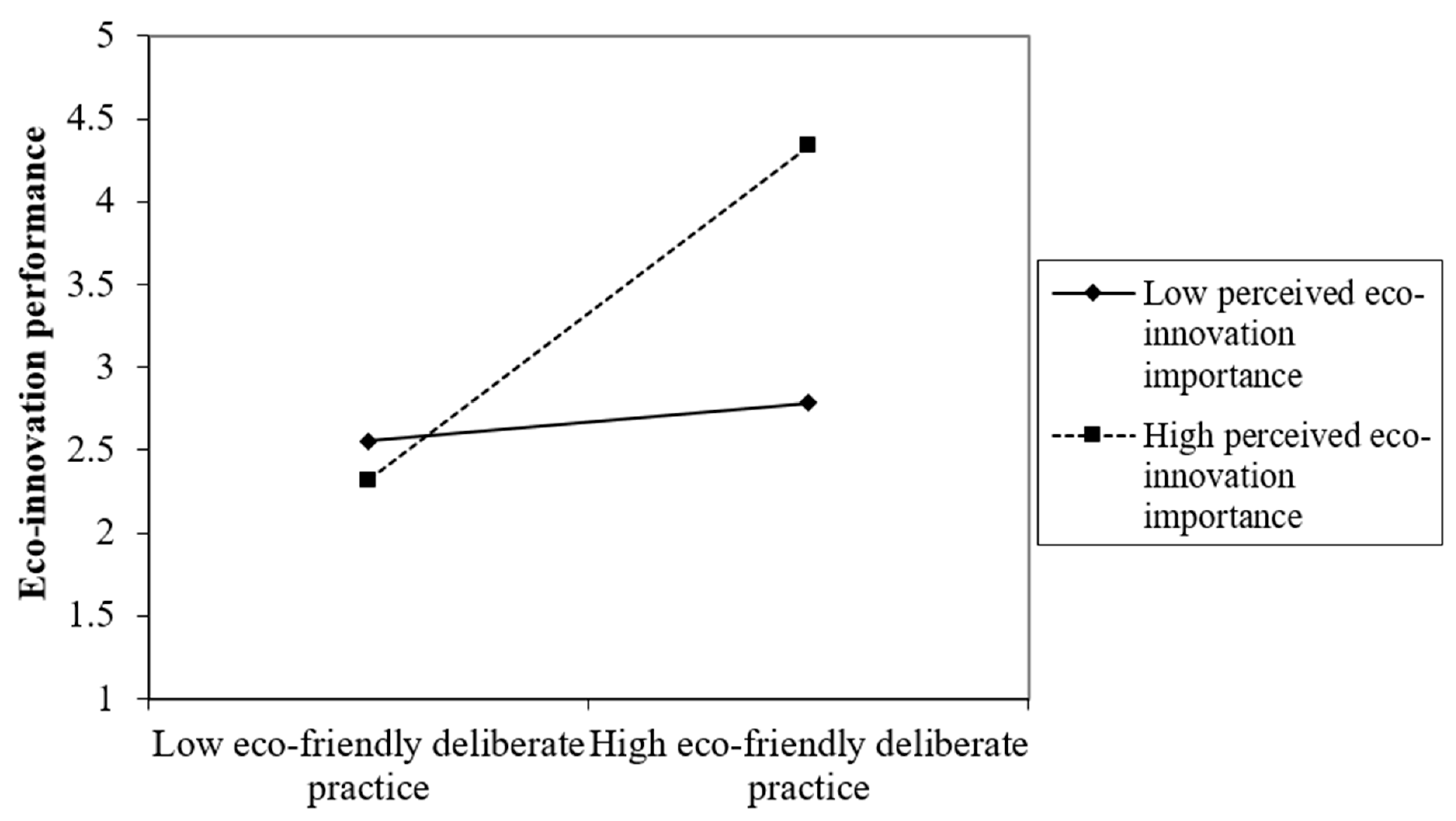The Road to Eco-Excellence: How Does Eco-Friendly Deliberate Practice Foster Eco-Innovation Performance through Creative Self-Efficacy and Perceived Eco-Innovation Importance
Abstract
1. Introduction
2. Hypotheses
2.1. Eco-Friendly Deliberate Practice and Creative Self-Efficacy
2.2. Creative Self-Efficacy and Eco-Innovation Performance
2.3. The Mediating Role of Creative Self-Efficacy
2.4. The Moderating Role of Perceived Eco-Innovation Importance
2.5. A Moderated Mediation Model
3. Method
3.1. Sample and Procedure
3.2. Measures
3.2.1. Eco-Friendly Deliberate Practice
3.2.2. Creative Self-Efficacy
3.2.3. Eco-Innovation Performance
3.2.4. Perceived Eco-Innovation Importance
3.2.5. Data Analysis
4. Results
4.1. Measurement Model
4.2. Structural Model
5. Discussion and Conclusions
6. Implications for Theory
7. Implications for Practice
8. Limitations and Future Directions
Author Contributions
Funding
Institutional Review Board Statement
Informed Consent Statement
Data Availability Statement
Conflicts of Interest
References
- Elshaer, I.A.; Sobaih, A.E.E.; Aliedan, M.; Azazz, A.M. The effect of green human resource management on environmental performance in small tourism enterprises: Mediating role of pro-environmental behaviors. Sustainability 2021, 13, 1956. [Google Scholar] [CrossRef]
- Gao, Y.; Lin, R.; Lu, Y. A visualized analysis of the research current hotspots and trends on innovation chain based on the knowledge map. Sustainability 2022, 14, 1708. [Google Scholar] [CrossRef]
- Geng, D.; Lai, K.H.; Zhu, Q. Eco-innovation and its role for performance improvement among Chinese small and medium-sized manufacturing enterprises. Int. J. Prod. Econ. 2021, 231, 107869. [Google Scholar] [CrossRef]
- Kemp, R.; Pearson, P. Final report MEI project about measuring eco-innovation. UM Merit Maastricht 2007, 10, 1–120. [Google Scholar]
- Corcoles Munoz, M.M.; Parra Requena, G.; Garcia Villaverde, P.M.; Ruiz Ortega, M.J. Relational antecedents of sustainability orientation in hospitality and tourism firms: The mediating role of absorptive capacity. J. Sustain. Tour. 2022, 1–23. [Google Scholar] [CrossRef]
- Araújo, R.; Franco, M. The use of collaboration networks in search of eco-innovation: A systematic literature review. J. Clean. Prod. 2021, 314, 127975. [Google Scholar] [CrossRef]
- Ch’ng, P.C.; Cheah, J.; Amran, A. Eco-innovation practices and sustainable business performance: The moderating effect of market turbulence in the Malaysian technology industry. J. Clean. Prod. 2021, 283, 124556. [Google Scholar] [CrossRef]
- Gürlek, M.; Koseoglu, M.A. Green innovation research in the field of hospitality and tourism: The construct, antecedents, consequences, and future outlook. Serv. Ind. J. 2021, 41, 734–766. [Google Scholar] [CrossRef]
- Bilal, A.R.; Fatima, T. Deliberate practice and individual entrepreneurial orientation training retention: A multi-wave field experiment. Eur. J. Work. Organ. Psychol. 2022, 31, 352–366. [Google Scholar] [CrossRef]
- Muisyo, P.K.; Qin, S. Enhancing the FIRM’S green performance through green HRM: The moderating role of green innovation culture. J. Clean. Prod. 2021, 289, 125720. [Google Scholar] [CrossRef]
- Baker, J.; Côté, J.; Deakin, J. Expertise in ultra-endurance triathletes early sport involvement, training structure, and the theory of deliberate practice. J. Appl. Sport Psychol. 2005, 17, 64–78. [Google Scholar] [CrossRef]
- Chen, R.H. Effects of deliberate practice on blended learning sustainability: A community of inquiry perspective. Sustainability 2022, 14, 1785. [Google Scholar] [CrossRef]
- Ericsson, K.A. Deliberate practice and the acquisition and maintenance of expert performance in medicine and related domains. Acad. Med. 2004, 79, S70–S81. [Google Scholar] [CrossRef] [PubMed]
- Ericsson, K.A. Deliberate practice and acquisition of expert performance: A general overview. Acad. Emerg. Med. 2008, 15, 988–994. [Google Scholar] [CrossRef] [PubMed]
- Ericsson, K.A.; Harwell, K.W. Deliberate practice and proposed limits on the effects of practice on the acquisition of expert performance: Why the original definition matters and recommendations for future research. Front. Psychol. 2019, 10, 2396. [Google Scholar] [CrossRef]
- Farooq, R.; Zhang, Z.; Talwar, S.; Dhir, A. Do green human resource management and self-efficacy facilitate green creativity? A study of luxury hotels and resorts. J. Sustain. Tour. 2022, 30, 824–845. [Google Scholar] [CrossRef]
- Bandura, A. Social Foundation of Thought and Action: A Social Cognitive Theory; Prentice-Hall: Englewood Cliffs, NJ, USA, 1986. [Google Scholar]
- Bandura, A. Social cognitive theory: An agentic perspective. Annu. Rev. Psychol. 2001, 52, 1–26. [Google Scholar] [CrossRef]
- Campitelli, G.; Gobet, F. Deliberate practice: Necessary but not sufficient. Curr. Dir. Psychol. Sci. 2011, 20, 280–285. [Google Scholar] [CrossRef]
- Starkes, J.L.; Deakin, J.M.; Allard, F.; Hodges, N.J.; Hayes, A. Deliberate practice in sports: What is it anyway? In The Road to Excellence; Psychology Press: London, UK, 2014; pp. 81–106. [Google Scholar]
- Ericsson, K.A.; Krampe, R.T.; Tesch-Römer, C. The role of deliberate practice in the acquisition of expert performance. Psychol. Rev. 1993, 100, 363. [Google Scholar] [CrossRef]
- Hambrick, D.Z.; Oswald, F.L.; Altmann, E.M.; Meinz, E.J.; Gobet, F.; Campitelli, G. Deliberate practice: Is that all it takes to become an expert? Intelligence 2014, 45, 34–45. [Google Scholar] [CrossRef]
- Van de Wiel, M.W.; Van den Bossche, P.; Janssen, S.; Jossberger, H. Exploring deliberate practice in medicine: How do physicians learn in the workplace? Adv. Health Sci. Educ. 2011, 16, 81–95. [Google Scholar] [CrossRef] [PubMed]
- Williams, G.R.; Farmer, L.C.; Manwaring, M. New technology meets an old teaching challenge: Using digital video recordings, annotation software, and deliberate practice techniques to improve student negotiation skills. Negot. J. 2008, 24, 71–87. [Google Scholar] [CrossRef]
- Sonnentag, S.; Kleine, B.M. Deliberate practice at work: A study with insurance agents. J. Occup. Organ. Psychol. 2000, 73, 87–102. [Google Scholar] [CrossRef]
- Monk, J. Revealing the iceberg: Creative writing, process & deliberate practice. Engl. Educ. 2016, 50, 95–115. [Google Scholar]
- Ericsson, A.; Pool, R. Peak: Secrets from the New Science of Expertise; Random House: New York, NY, USA, 2016. [Google Scholar]
- Andersen, S.A.; Konge, L.; Mikkelsen, P.T.; Cayé-Thomasen, P.; Sørensen, M.S. Mapping the plateau of novices in virtual reality simulation training of mastoidectomy. Laryngoscope 2017, 127, 907–914. [Google Scholar] [CrossRef] [PubMed]
- Setiawan, J.L.; Kasim, A.; Ardyan, E. Understanding the Consumers of Entrepreneurial Education: Self-Efficacy and Entrepreneurial Attitude Orientation among Youths. Sustainability 2022, 14, 4790. [Google Scholar] [CrossRef]
- Ng, T.W.; Shao, Y.; Koopmann, J.; Wang, M.; Hsu, D.Y.; Yim, F.H. The effects of idea rejection on creative self-efficacy and idea generation: Intention to remain and perceived innovation importance as moderators. J. Organ. Behav. 2022, 43, 146–163. [Google Scholar] [CrossRef]
- Mabry, J.; Lee, E.; Roberts, T.; Garrett, R. Virtual simulation to increase self-efficacy through deliberate practice. Nurse Educ. 2020, 45, 202–205. [Google Scholar] [CrossRef]
- Puente-Díaz, R. Creative self-efficacy: An exploration of its antecedents, consequences, and applied implications. J. Psychol. 2016, 150, 175–195. [Google Scholar] [CrossRef]
- Loučanová, E.; Šupín, M.; Čorejová, T.; Repková-Štofková, K.; Šupínová, M.; Štofková, Z.; Olšiaková, M. Sustainability and branding: An integrated perspective of eco-innovation and brand. Sustainability 2021, 13, 732. [Google Scholar] [CrossRef]
- Nwagwu, U. A SWOT Analysis on the Use of Blockchain in Supply Chains. Master’s Thesis, Wichita State University, Wichita, KS, USA, 2015. [Google Scholar]
- Sobczak, E.; Głuszczuk, D. Diversification of eco-innovation and innovation activity of small and medium-sized enterprises in the european union countries. Sustainability 2022, 14, 1970. [Google Scholar] [CrossRef]
- García-Granero, E.M.; Piedra-Muñoz, L.; Galdeano-Gómez, E. Eco-innovation measurement: A review of firm performance indicators. J. Clean. Prod. 2018, 191, 304–317. [Google Scholar] [CrossRef]
- Nwagwu, U. Impact of COVID-19 on the supply chain of the food industry: A literature analysis. Int. J. Adv. Res. Stats Manag. Fin. 2021, 8, 37–44. [Google Scholar]
- Maxwell, S.E.; Cole, D.A. Bias in cross-sectional analyses of longitudinal mediation. Psychol. Methods 2007, 12, 23. [Google Scholar] [CrossRef] [PubMed]
- Cole, D.A.; Maxwell, S.E. Testing mediational models with longitudinal data: Questions and tips in the use of structural equation modeling. J. Abnorm. Psychol. 2003, 112, 558. [Google Scholar] [CrossRef] [PubMed]
- Sahabuddin, M.; Qingmei, T.; Ayub, A.; Fatima, T.; Ishaq, M.; Ali Junaid, K. Workplace ostracism and employee silence: An identity-based perspective. Kybernetes 2021, 52, 97–120. [Google Scholar] [CrossRef]
- Sonnentag, S.; Irion, G. Deliberate Learning at Work: A New Questionnaire Measure and Its Nomological Net; Unpublished work; University of Mannheim: Mannheim, Germany, 2010. [Google Scholar]
- Malik, M.A.R.; Butt, A.N.; Choi, J.N. Rewards and employee creative performance: Moderating effects of creative self-efficacy, reward importance, and locus of control. J. Organ. Behav. 2015, 36, 59–74. [Google Scholar] [CrossRef]
- Tierney, P.; Farmer, S.M. Creative self-efficacy: Its potential antecedents and relationship to creative performance. Acad. Manag. J. 2002, 45, 1137–1148. [Google Scholar] [CrossRef]
- Welbourne, T.M.; Johnson, D.E.; Erez, A. The role-based performance scale: Validity analysis of a theory-based measure. Acad. Manag. J. 1998, 41, 540–555. [Google Scholar] [CrossRef]
- Hair, J.F., Jr.; Sarstedt, M.; Ringle, C.M.; Gudergan, S.P. Advanced Issues in Partial Least Squares Structural Equation Modeling; SAGE Publications: Thousand Oaks, CA, USA, 2018. [Google Scholar]
- Green, J.P.; Tonidandel, S.; Cortina, J. Getting through the gate: Statistical and methodological issues raised in the reviewing process. Organ. Res. Methods 2016, 19, 402–432. [Google Scholar] [CrossRef]
- Nunnally, J.; Bernstein, I.H. Psychometric Theory, 3rd ed.; McGraw Hill: New York, NY, USA, 1994. [Google Scholar]
- Henseler, J.; Ringle, C.M.; Sinkovics, R.R. The use of partial least squares path modeling in international marketing. In New Challenges to International Marketing; Emerald Group Publishing Limited: Bingley, UK, 2009. [Google Scholar]
- Henseler, J.; Ringle, C.M.; Sarstedt, M. A new criterion for assessing discriminant validity in variance-based structural equation modeling. J. Acad. Mark. Sci. 2015, 43, 115–135. [Google Scholar] [CrossRef]
- Zhao, X.; Lynch, J.G., Jr.; Chen, Q. Reconsidering Baron and Kenny: Myths and truths about mediation analysis. J. Consum. Res. 2010, 37, 197–206. [Google Scholar] [CrossRef]
- Henseler, J.; Fassot, G. Testing moderating effects in PLS models: An illustration of available procedures. In Handbook of Partial Least Squares: Concepts, Methods and Applications in Marketing and Related Fields; VinziV, E., ChinW, W., Henseler, J., Wang, H., Eds.; Springer: Berlin, Germany, 2010; pp. 195–218. [Google Scholar]
- Dawson, J.F. Moderation in management research: What, why, when, and how. J. Bus. Psychol. 2014, 29, 1–19. [Google Scholar] [CrossRef]
- Tenenhaus, M.; Vinzi, V.E.; Chatelin, Y.M.; Lauro, C. PLS path modeling. Comput. Stat. Data Anal. 2005, 48, 159–205. [Google Scholar] [CrossRef]
- Hoffmann, A.; Birnbrich, C. The impact of fraud prevention on bank-customer relationships: An empirical investigation in retail banking. Int. J. Bank Mark. 2012, 30, 390–407. [Google Scholar] [CrossRef]
- Dew, N.; Ramesh, A.; Read, S.; Sarasvathy, S.D.; Virginia, V. Toward deliberate practice in the development of entrepreneurial expertise: The anatomy of the effectual ask. Camb. Handb. Expert. Expert Perform. 2018, 2018, 389–412. [Google Scholar]
- Chereau, P.; Meschi, P.X. Deliberate practice of entrepreneurial learning and self-efficacy: The moderating effect of entrepreneurial parental environment as role modeling. J. Small Bus. Enterp. Dev. 2021, 29, 461–483. [Google Scholar] [CrossRef]
- Keith, N.; Unger, J.M.; Rauch, A.; Frese, M. Informal learning and entrepreneurial success: A longitudinal study of deliberate practice among small business owners. Appl. Psychol. 2016, 65, 515–540. [Google Scholar] [CrossRef]
- Demircioglu, M.A.; Van der Wal, Z. Leadership and innovation: What’s the story? The relationship between leadership support level and innovation target. Public Manag. Rev. 2022, 24, 1289–1311. [Google Scholar] [CrossRef]
- Bellot, J. Defining and assessing organizational culture. In Nursing Forum; Blackwell Publishing Inc.: Malden, MA, USA, 2011; Volume 46, pp. 29–37. [Google Scholar]
- Rhoades, L.; Eisenberger, R. Perceived organizational support: A review of the literature. J. Appl. Psychol. 2002, 87, 698. [Google Scholar] [CrossRef]
- Vallerand, R.J.; Blanchard, C.; Mageau, G.A.; Koestner, R.; Ratelle, C.; Léonard, M.; Marsolais, J. Les passions de l’ame: On obsessive and harmonious passion. J. Personal. Soc. Psychol. 2003, 85, 756. [Google Scholar] [CrossRef] [PubMed]
- Eskreis-Winkler, L.; Shulman, E.P.; Young, V.; Tsukayama, E.; Brunwasser, S.M.; Duckworth, A.L. Using wise interventions to motivate deliberate practice. J. Person. Soc. Psy. 2016, 111(5), 728. [Google Scholar] [CrossRef] [PubMed]
- Sekiguchi, T. Person-organization fit and person-job fit in employee selection: A review of the literature. Osaka Keidai Ronshu 2004, 54, 179–196. [Google Scholar]
- Chorpita, B.F.; Daleiden, E.L. Structuring the collaboration of science and service in pursuit of a shared vision. In Future Work in Clinical Child and Adolescent Psychology; Routledge: London, UK, 2018; pp. 13–28. [Google Scholar]
- Podsakoff, N.P. Common method biases in behavioral research: A critical review of the literature and recommended remedies. J. Appl. Psychol. 2003, 88, 879–903. [Google Scholar] [CrossRef]
- Vuong, Q.H.; Le, T.T.; La, V.P.; Nguyen HT, T.; Ho, M.T.; Van Khuc, Q.; Nguyen, M.H. Covid-19 vaccines production and societal immunization under the serendipity-mindsponge-3D knowledge management theory and conceptual framework. Humanit. Soc. Sci. Commun. 2022, 9, 22. [Google Scholar] [CrossRef]
- Khuc, V.Q. Mindspongeconomics. OSF Prepr. 2022. [Google Scholar] [CrossRef]
- Vuong, Q.H. Mindsponge Theory; De Gruyter: Berlin, Germany, 2023. [Google Scholar]
- Vuong, Q.H.; Le, T.T.; Khuc, Q.; Nguyen, M.H. A new theory of serendipity. In A New Theory of Serendipity: Nature, Emergence and Mechanism; Vuong, Q.H., Ed.; De Gruyter: Berlin, Germany, 2022; pp. 91–108. [Google Scholar]



| Loadings | AVE | CR | Cronbach’s Alpha | |
|---|---|---|---|---|
| Eco-friendly deliberate practice | 0.520 | 0.882 | 0.846 | |
| EDP1 | 0.752 | |||
| EDP2 | 0.653 | |||
| EDP3 | 0.832 | |||
| EDP4 | 0.713 | |||
| EDP5 | 0.743 | |||
| EDP6 | 0.664 | |||
| EDP7 | 0.634 | |||
| EDP8 | 0.764 | |||
| EDP9 | 0.623 | |||
| EDP10 | 0.723 | |||
| EDP11 | 0.753 | |||
| EDP12 | 0.653 | |||
| EDP13 | 0.775 | |||
| EDP14 | 0.674 | |||
| EDP15 | 0.773 | |||
| Creative self-efficacy | 0.533 | 0.912 | 0.868 | |
| CSE1 | 0.675 | |||
| CSE2 | 0.676 | |||
| CSE3 | 0.800 | |||
| CSE4 | 0.762 | |||
| Eco-innovation performance | 0.511 | 0.890 | 0.848 | |
| EP1 | 0.774 | |||
| EP2 | 0.625 | |||
| EP3 | 0.754 | |||
| EP4 | 0.685 | |||
| Perceived eco-innovation importance | 0.550 | 0.843 | 0.801 | |
| PEI1 | 0.748 | |||
| PEI2 | 0.838 | |||
| PEI3 | 0.683 | |||
| PEI4 | 0.743 | |||
| PEI5 | 0.633 | |||
| PEI6 | 0.773 |
| EDP | CSE | EP | PEI | |
|---|---|---|---|---|
| EDP | ||||
| CSE | 0.702 CI.0.900 [0.640;0.780] | |||
| EP | 0.711 CI.0.900 [0.652;0.792] | 0.601 CI.0.900 [0.516;0.693] | ||
| PEI | 0.647 CI.0.900 [0.562;0.721] | 0.456 CI.0.900 [0.371;0.523] | 0.711 CI.0.900 [0.635;0.776] |
| Hypotheses | β | CI (5%, 95%) | SE | t-Value | p-Value | Decision | f2 | R2 | Q2 |
|---|---|---|---|---|---|---|---|---|---|
| H1 EDP → CSE | 0.512 ** | (0.441, 0.589) | 0.052 | 12.334 | 0.000 | Supported | 0.232 | 0.554 | 0.363 |
| H2 CSE → EP | 0.526 ** | (0.463, 0.592) | 0.037 | 4.732 | 0.003 | Supported | 0.432 | 0.486 | |
| H4 EDP × PEI → CSE | 0.429 ** | (0.334, 0.519) | 0.062 | 9.832 | 0.000 | Supported | 0.124 | ||
| H5 EDP × PEI → EP | 0.447 ** | (0.355, 0.525) | 0.051 | 14.428 | 0.000 | Supported | 0.185 |
| Path | t-Value | BCCI | Path | t-Value | 95% BCCI | Decision | VAF | ||
|---|---|---|---|---|---|---|---|---|---|
| Direct effect EDP → EP | 0.412 ** | 11.228 | (0.332, 0.481) | Indirect effect EDP → CSE → EP | 0.342 ** | 7.110 | (0.267, 0.416) | Supported | 45.35% |
| Constructs | AVE | R2 |
|---|---|---|
| EDP | 0.520 | |
| CSE | 0.533 | 0.554 |
| EP | 0.511 | 0.486 |
| PEI | 0.550 | |
| Average scores | 0.528 | 0.520 |
| (GFI = ) | 0.524 |
Disclaimer/Publisher’s Note: The statements, opinions and data contained in all publications are solely those of the individual author(s) and contributor(s) and not of MDPI and/or the editor(s). MDPI and/or the editor(s) disclaim responsibility for any injury to people or property resulting from any ideas, methods, instructions or products referred to in the content. |
© 2023 by the authors. Licensee MDPI, Basel, Switzerland. This article is an open access article distributed under the terms and conditions of the Creative Commons Attribution (CC BY) license (https://creativecommons.org/licenses/by/4.0/).
Share and Cite
Miao, Y.; Iqbal, S.; Ayub, A. The Road to Eco-Excellence: How Does Eco-Friendly Deliberate Practice Foster Eco-Innovation Performance through Creative Self-Efficacy and Perceived Eco-Innovation Importance. Sustainability 2023, 15, 3481. https://doi.org/10.3390/su15043481
Miao Y, Iqbal S, Ayub A. The Road to Eco-Excellence: How Does Eco-Friendly Deliberate Practice Foster Eco-Innovation Performance through Creative Self-Efficacy and Perceived Eco-Innovation Importance. Sustainability. 2023; 15(4):3481. https://doi.org/10.3390/su15043481
Chicago/Turabian StyleMiao, Yinjia, Shahid Iqbal, and Arslan Ayub. 2023. "The Road to Eco-Excellence: How Does Eco-Friendly Deliberate Practice Foster Eco-Innovation Performance through Creative Self-Efficacy and Perceived Eco-Innovation Importance" Sustainability 15, no. 4: 3481. https://doi.org/10.3390/su15043481
APA StyleMiao, Y., Iqbal, S., & Ayub, A. (2023). The Road to Eco-Excellence: How Does Eco-Friendly Deliberate Practice Foster Eco-Innovation Performance through Creative Self-Efficacy and Perceived Eco-Innovation Importance. Sustainability, 15(4), 3481. https://doi.org/10.3390/su15043481






